Am I Pregnant? How to Spot the Signs and Symptoms of Pregnancy

Pregnancy can be a different experience for every woman, and that includes what happens in the first 72 hours of being pregnant and later. Some people notice changes right away, while others may have to wait weeks or even months to see the signs. In this guide, we’ll look at pregnancy symptoms and answer common questions you might have about conception, pregnancy, and having a baby.
Contents:
- When Do The Symptoms Start: How Quickly Can I Know if I’m Pregnant?
- When Can I Take a Pregnancy Test?
- Early Pregnancy Signs
- Other Signs and Symptoms of Pregnancy
- Main Symptoms of Pregnancy
- FAQs
When Do the Symptoms Start: How Quickly Can I Know if I’m Pregnant?
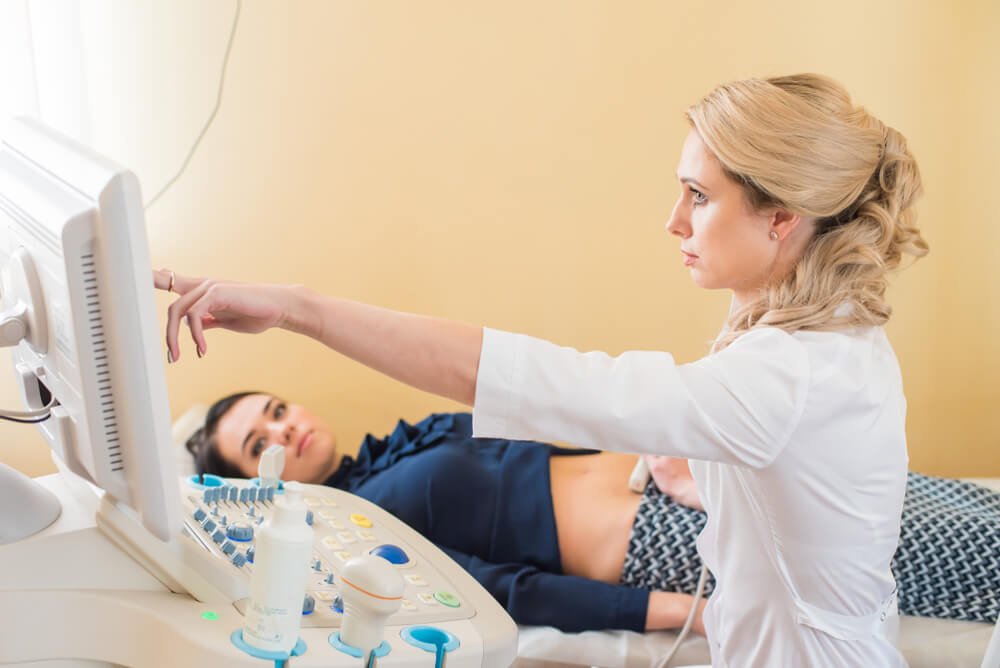
Prostock-studio/Shutterstock.com
If you’re trying to have a baby, you’ll probably want to find out if you’re pregnant as quickly as possible. However, you may need to be patient. Studies and surveys have repeatedly shown that the onset of symptoms can vary from person to person.
Some women notice early pregnancy symptoms just days after conceiving, while others may go weeks or longer without feeling any change.
a leading study on this subject looked at a total of 136 pregnant women and found the following:
- 50% of the women experienced symptoms by the time they were five weeks pregnant;
- 70% noticed symptoms by the sixth week of their pregnancy;
- 90% had symptoms before the eighth week of their pregnancy.
From this study and others, we can draw some conclusions. Firstly, it’s important to remember that your experience may be different from other women you know. So, even if you don’t notice the early signs of pregnancy right away, it doesn’t mean that you’re not pregnant. With that said, the majority (9 in 10) of women should notice at least one or two signs by the time they are eight weeks pregnant.
When Can I Take a Pregnancy Test?
The right time to take a pregnancy test can also vary from one person to the next. Some tests are sensitive enough to provide results several days before your next period is due. So, if you’re aware of the dates of your cycle, you could take a test in the days leading up to your next scheduled period.
However, testing too early can cause confusion, as your test might give you a negative or vague result, even if you are pregnant. That’s why most experts recommend waiting until at least a day after your missed period if you want the most accurate response.
Early Pregnancy Signs

Prostock-studio/Shutterstock.com
There are many possible signs of pregnancy. Here are some of the earliest signs and symptoms you may notice in the first days and weeks of becoming pregnant.
Missed Period
This is one of the clearest signs of all, and it’s usually the first one that most people notice. A lot depends on the individual, but if you otherwise have a regular menstrual period, and you are now late, it’s possible you are pregnant.
The sign could be less reliable for those who don’t have a regular menstrual cycle due to hormonal imbalance or other reasons. But if you are late and have reasons to believe you are carrying a baby, take a test to be sure. It might turn out that you are already a week pregnant or longer.
Urinating Often
Another common sign of pregnancy is needing to urinate more regularly. This is caused by hormonal changes, leading to your kidneys and bladder essentially becoming more active.
Although the urination urge increases during pregnancy, other things like a cold or bladder infection could also cause it. It’s why this isn’t a reliable sign until you actually take a test.
Tiredness
Have you been feeling really tired lately? If so, it could be a sign of pregnancy, most likely tied to changes in hormonal levels in your body. That imbalance leads to fatigue and makes you want to sleep longer than regularly.
If your tiredness level seems unusual, perhaps you are already in the fifth or sixth week of pregnancy.

Prostock-studio/Shutterstock.com
Bloated Feeling
Some women who are several weeks pregnant also report a bloated feeling. Your stomach might feel full, your clothes may feel a little tighter, and you’ll generally feel less energetic and comfortable than usual. The bloatedness could even lead to shortness of breath in some cases.
Mood Swings
It’s not uncommon for pregnant women to show signs of mood swings and emotional instability in the early stages, too. Again, this is all caused by hormones.
Heightened irritability, especially by things you haven’t found annoying before, is a common indicator of hormonal imbalance.
Breast Tenderness
Another potential sign on our checklist is breast tenderness or soreness, and this is also due to your body’s hormone levels shifting and changing.
Swollen breasts could also be a part of some women’s premenstrual symptoms. If that’s something that occurs to you during that time, this isn’t such a reliable sign that you could be one week pregnant.
Nausea
Morning sickness is a very well-known pregnancy symptom, and it can start just a couple of weeks after conception.
A heightened sense of certain tastes, especially those you find uncomfortable, is common for a pregnant person. If that comes with vomiting, these are all reasons to take a test and see whether you might be several weeks pregnant.
Other Signs and Symptoms of Pregnancy

Prostock-studio/Shutterstock.com
Some other possible signs of pregnancy may include:
- Higher body temperature – Pregnant women tend to have a slightly higher than normal basal body temperature. You can use a body thermometer to keep track of this.
- A stronger sense of smell – Your sense of smell may become more sensitive, leading to certain odors seeming more pronounced and noticeable
- Light spotting or bleeding – You may notice some light spotting and bleeding in the early days after conception and fertilization, as though you were about to have your period
- Changes in cervical mucus – Cervical mucus may become thicker and creamier after fertilization; you may also notice more vaginal discharge as the pregnancy continues
- Excess saliva – Many moms-to-be notice that they are producing lots of saliva, and it is believed that this is the body’s method of protecting the teeth from excess stomach acid
- Cravings for certain foods – You might start wanting very specific foods or having cravings for unusual flavors that you don’t normally like
- Sudden dislike of certain foods – You may also find that there are certain foods or drinks you suddenly find disgusting or unpleasant
Main Symptoms of Pregnancy By Months
Next, let’s look at some of the most common signs of pregnancy that will occur throughout the entire journey of your baby’s creation and growth. We’ll go through each stage of pregnancy, from the first weeks through to the final months, and look at what happens in each one.
The First Month (1–5 weeks)

Prostock-studio/Shutterstock.com
The first couple of weeks is critical for any pregnancy. This is when the egg is first released from the ovary, in a process known as ovulation. It travels along the Fallopian tube and can come into contact with a sperm cell, leading to fertilization.
After that, the newly-fertilized egg will start to divide and travel into the uterus. After a few days, it attaches to the lining of the uterus, in a process called implantation. This process can take a few days to finalize, but once the egg is attached, the process of embryo development can begin.
In these early weeks, the main sign that most people notice is a missed period.
This can also be accompanied by some or all of the other signs listed above, like breast tenderness, nausea, tiredness, and mood swings.
The Second Month

Prostock-studio/Shutterstock.com
In the second month, the cells in the uterus start to multiply and develop further into an embryo. This is the start of the embryonic phase, and it occurs about the sixth week after the initial egg release. During this phase, the embryo is just a few millimeters in length, but its organs and systems are already starting to develop.
In terms of symptoms, most women will have experienced at least one symptom by the eighth week of their pregnancy.
The signs tend to become more pronounced and clear at this time and can include frequent urination, vomiting, breast soreness, and general tiredness, too.
The Third Month

Prostock-studio/Shutterstock.com
In the third month, the embryo grows into a fetus. The umbilical cord extends and connects the fetus to the placenta, and sex organs start to develop, indicating whether the baby is a boy or a girl. Organs grow bigger and physical features become more pronounced, too.
The symptoms during the third month can be quite severe. Many pregnant women experience nausea at this time, coupled with changes in the breasts, like darkness around the nipples.
The Fourth Month

Prostock-studio/Shutterstock.com
In the fourth month, the fetus is now about three inches long and an ultrasound scan may be able to tell you the child’s sex.
Some of the early symptoms can start to subside at this stage, but other symptoms – like heartburn and digestive issues – may appear. Breast changes will also continue and dizziness can occur, too.
The Fifth Month

Prostock-studio/Shutterstock.com
In the fifth month, the fetus develops a little layer of body hair called lanugo and grows to around six or seven inches.
At this stage, you might be able to feel the first movements of your baby inside you. Symptoms from the fourth month may also progress and worsen, in some cases.
The Sixth Month
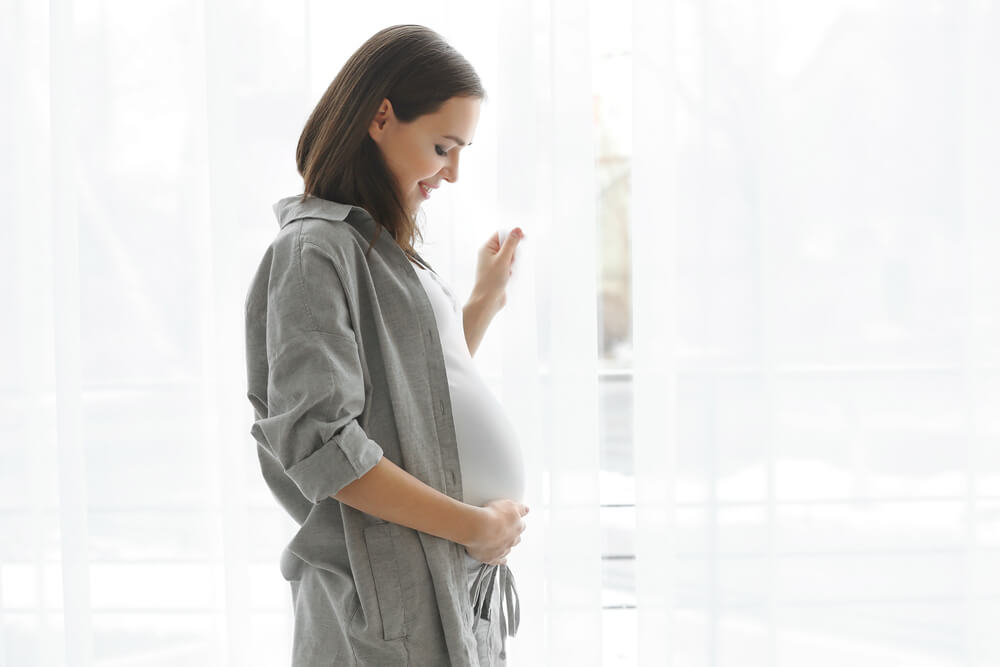
Prostock-studio/Shutterstock.com
In the sixth month, the fetus’ bone marrow begins making blood cells.
Symptoms at this stage can include tiredness, shortness of breath, dizziness, and “Braxton-Hicks contractions”, which are like a squeezing of the uterus as it prepares for labor. These contractions can be scary at first but are perfectly normal.
The Seventh Month
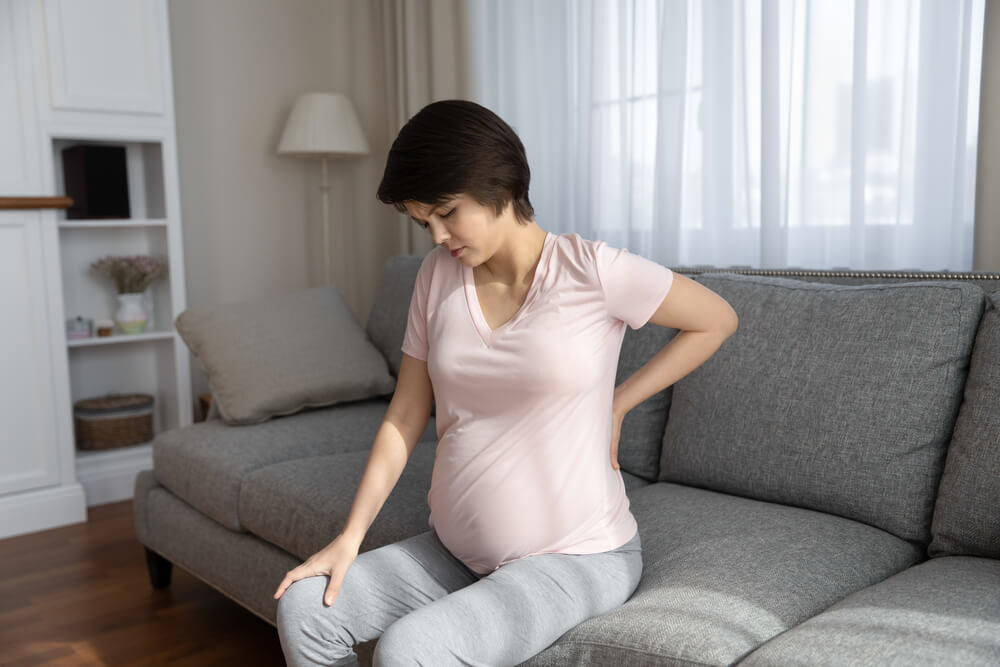
Prostock-studio/Shutterstock.com
In month seven, the fetus grows up to 10 inches and starts getting fatter.
During this month, due to the fact that the baby is becoming heavier, you may notice your stomach getting bigger and you can experience back pain.
The Eighth Month
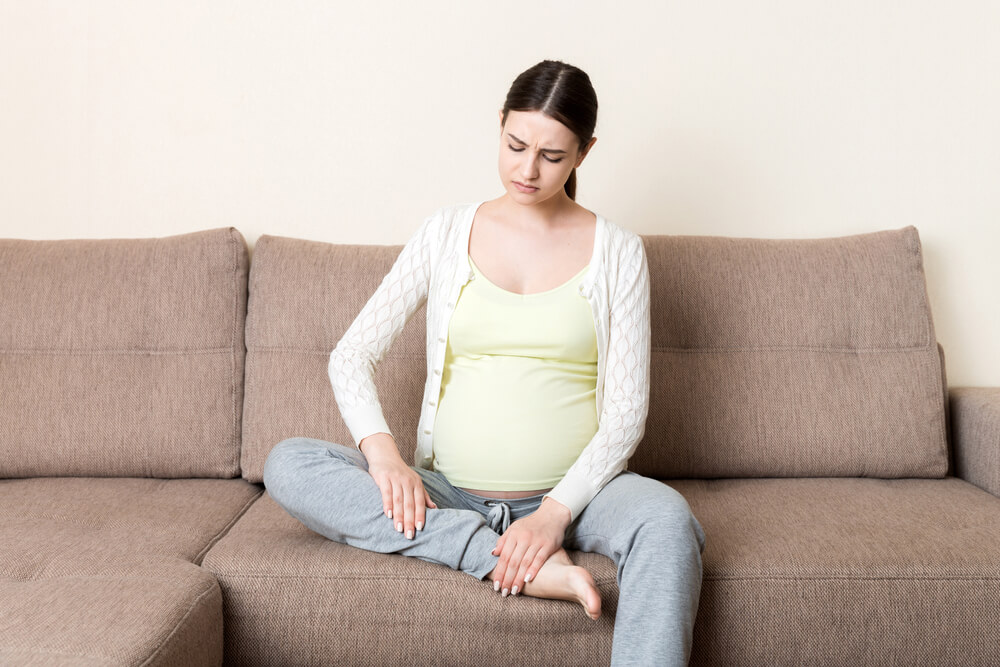
Prostock-studio/Shutterstock.com
In month eight, the hair on the fetus’ body falls away and it continues growing.
Tiredness is common at this stage of pregnancy. Varicose veins may also occur, along with hemorrhoids, stretch marks, heartburn, and Braxton-Hicks contractions.
The Ninth Month
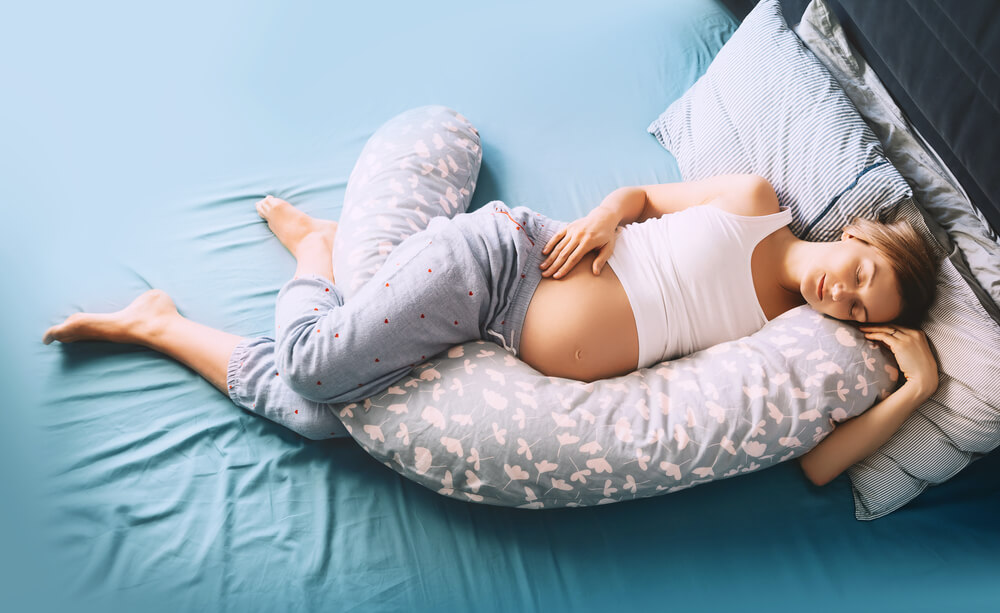
Prostock-studio/Shutterstock.com
At the ninth month stage, the fetus is almost fully developed, with eyes and plenty of body fat. Common symptoms can include tiredness, frequent need to urinate, varicose veins, stretch marks, and heartburn.
The Tenth Month
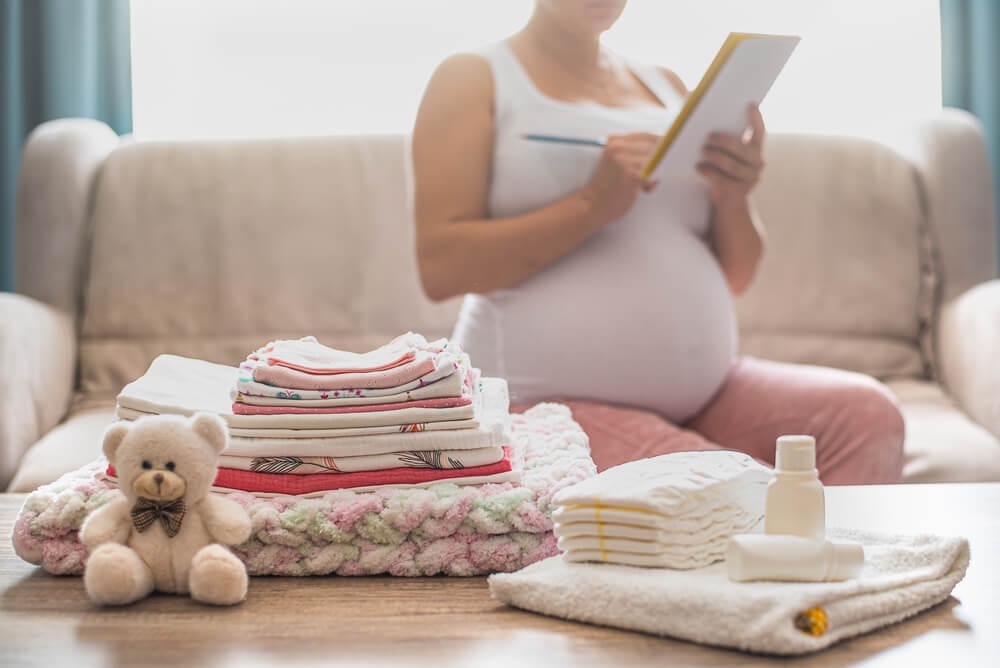
It’s in the tenth month after the egg was first released that most people give birth. The signs of labor include a dilated cervix and pain in the vagina.
Related: The Ultimate Baby Registry Checklist for Expecting Parents.
Every Pregnancy Is Different
Ultimately, it’s important to remember that every pregnancy is different. Symptoms, signs, and experiences can vary massively from person to person. That’s why it’s important to remain calm, listen to your body, and speak with your own healthcare provider if you do notice any signs or have any doubts or concerns.
Be sure to share this article with your own friends and family to help more moms-to-be learn more about what to expect when they get pregnant!
FAQs

Prostock-studio/Shutterstock.com
Is there any difference between a boy’s and a girl’s pregnancy symptoms?
Studies have not provided any conclusive evidence on this matter in one way or another. However, some experts say that symptoms can vary based on the sex of the baby. Women who are carrying girls may be more likely to experience nausea, for example, while those carrying boys are more likely to develop dietary changes like food aversions and a much bigger appetite.
What about twins?
Early signs of a pregnancy with twins can include severe nausea, more rapid weight gain than a regular pregnancy, and more pronounced breast tenderness.
Is it possible to have pregnancy signs without being pregnant?
Absolutely. Many of the early signs of pregnancy are similar to period symptoms, like cramps, spotting, tiredness, and mood swings. So it’s possible that the symptoms you’re feeling are not connected to pregnancy.
The only way to be sure is to wait and take a pregnancy test.
When should I contact my doctor?
It’s best to contact your doctor after you have missed a period and had a positive pregnancy test result.
Can I tell if I’m pregnant after 3 days?
There’s little chance of that happening. However, if you’ve missed your period, aim to take a pregnancy test as soon as possible.
Can I feel pregnant after 2 days?
Some early symptoms of pregnancy can include mild cramping, light bleeding or spotting, and breast tenderness. These rarely occur after a few days, so it’s best to take a pregnancy test to be sure.
What are 100% signs of pregnancy?
The most reliable signs of pregnancy include a missed period, tender or swollen breasts, and nausea or morning sickness. However, a pregnancy test is considered the only proven method to confirm you are pregnant.
How does your stomach feel at 1 week pregnant?
You might experience some heartburn, cramps, gas, bloating, or even constipation. General nausea might also occur in the early stages of pregnancy.
Проверьте электронный ящик



















